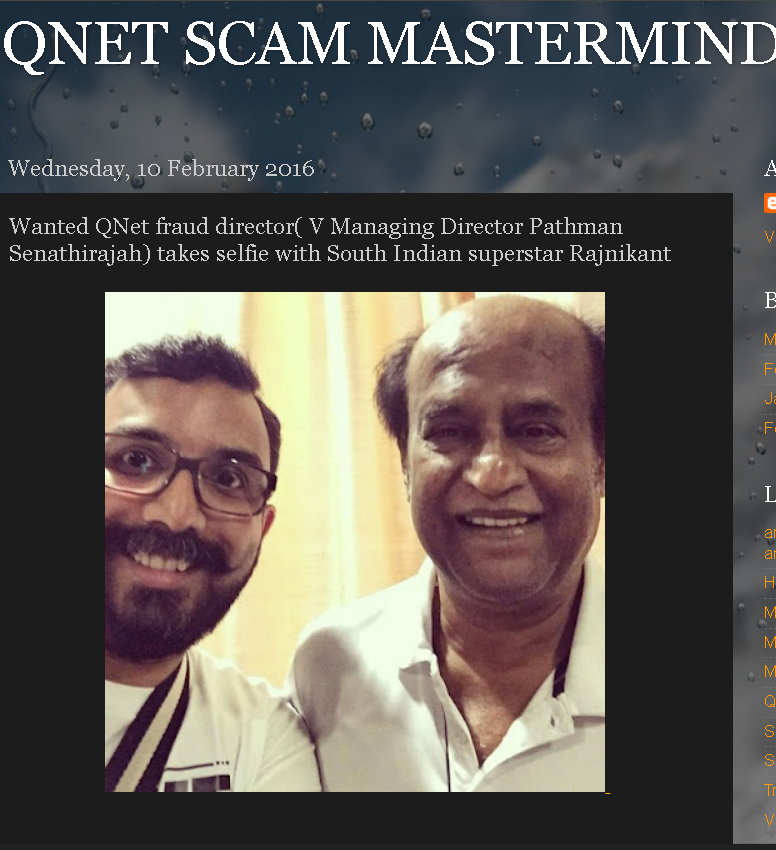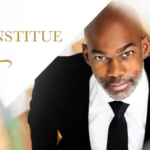Introduction
Pathman Senathirajah, a Malaysian entrepreneur, has built a global persona as a network marketing guru, motivational speaker, and director at the QI Group, QNet’s parent company. With over 24 years in direct selling, he touts resilience, teamwork, and ethical leadership, captivating audiences with promises of financial freedom. Yet, beneath this polished veneer lies a storm of controversy. Allegations of fraud, investor deception, and legal entanglements tied to QNet paint Senathirajah as a central figure in a problematic enterprise. His ventures, while lucrative for some, have left others financially ruined, raising urgent questions about his ethics and the risks of his business model.
This investigation peels back the layers of Senathirajah’s empire, examining his role in QNet’s operations, the ethical lapses that haunt his ventures, and the legal battles that threaten his legacy. Through insider accounts, expert analysis, and documented cases, we uncover a pattern of exploitation that demands scrutiny. For investors and partners eyeing his world of opportunity, this exposé serves as a stark warning: Pathman Senathirajah’s path to riches may lead to ruin.
The Rise of Pathman Senathirajah
Born in Malaysia, Pathman Senathirajah began his career with a law degree from the University of London, briefly working as a legal officer in Kuala Lumpur. At 18, he stumbled into network marketing, drawn by dreams of wealth unattainable in a traditional job. By the late 1990s, he joined QNet, a Hong Kong-based direct selling company under the QI Group, co-founding the Gengold team with his brother, Sathi Senathirajah. His charisma and legal acumen propelled him to prominence, earning the title “Chief” among followers.
Senathirajah’s public image is carefully curated. As QI Group’s Director of Marketing and Sales, he champions mentorship, teamwork, and personal growth, sharing insights via books like Even the Moon Has a Dark Side and Instagram Live sessions, which garnered over 3 million views in 2023. Articles in outlets like Outlook India and Khaleej Times praise his 24-year career, highlighting eight “building blocks” for success: resilience, ethics, vision, and collaboration. Yet, this narrative of triumph masks a darker reality, as QNet’s operations under his influence have sparked global backlash.
QNet: The Heart of Controversy

QNet, founded in 1998, markets health, wellness, and lifestyle products through a multi-level marketing (MLM) model. Distributors, or Independent Representatives (IRs), earn commissions by selling products and recruiting others, creating a pyramid-like structure. Senathirajah’s leadership has been pivotal, expanding QNet’s reach to over 100 countries, with reported revenues exceeding $1 billion. He describes direct selling as “relationship-based,” but critics argue it’s a thinly veiled pyramid scheme, profiting top recruiters like Senathirajah while ensnaring others in debt.
The company’s troubles are well-documented. In 2012, India’s Economic Offences Wing arrested QNet associates for allegedly defrauding investors of millions through overpriced products, like bio-discs claimed to “treat cancer.” By 2016, over 7,000 complaints flooded Indian authorities, prompting raids and charges under the Prize Chits and Money Circulation Schemes Act. Similar bans hit Rwanda, Sudan, and Sri Lanka, while Saudi Arabia and Turkey labeled QNet a scam. Senathirajah, though not directly charged, was named in lawsuits, with his 2016 selfie with actor Rajinikanth fueling perceptions of untouchability.
Ethical Quagmires: Allegations of Deception
Senathirajah’s ethics are under fire. QNet’s model requires IRs to buy costly starter kits—often $500 to $2,000—promising exponential returns through recruitment. Yet, studies, like a 2018 FTC report, show 99% of MLM participants lose money, with earnings skewed to top-tier figures like Senathirajah. A 2019 DirtyScam post accused him of leading a scam, citing $400,000 in investor losses and worthless products. “They sold plastic and glass as cancer cures,” one complainant wrote, echoing claims from India’s 2014 crackdowns.
Insider accounts paint a grim picture. A former IR, speaking anonymously to BehindMLM, described Senathirajah’s seminars as manipulative, pushing recruits to “invest” savings under promises of wealth. “He’d say failure is your fault, not the system,” they recalled, noting his dismissal of dropouts as “lacking vision.” Such tactics, experts argue, exploit psychological vulnerabilities, fostering guilt over skepticism. Dr. Jon Taylor, an MLM critic, labels QNet’s structure “inherently unethical,” designed to enrich leaders while trapping recruits in cycles of debt and recruitment.
Senathirajah’s defense—emphasizing transparency and hard work—falters against these charges. His 2023 Business Standard interview claimed consistency builds trust, yet QNet’s aggressive recruitment contradicts this, with IRs pressured to target family and friends. A 2020 QBUZZ post admitted “negative articles” dog QNet, which Senathirajah brushed off as misinformation, urging IRs to ignore critics. This deflection, analysts say, sidesteps accountability, perpetuating a culture where dissent is silenced.
Investor Risks: A House of Cards
Investing in QNet, under Senathirajah’s sway, is fraught with peril. The upfront costs, coupled with ongoing expenses for products and events, drain finances before commissions materialize. A 2017 Indian case saw a Mumbai teacher lose ₹1.5 million ($20,000) after joining, expecting quick returns that never came. “I sold my jewelry,” she told The Times of India, one of thousands alleging deception. Globally, similar stories abound—Egypt, Indonesia, Nigeria—where recruits faced ruin after buying into QNet’s dream.
The financial structure is rigged, experts argue. QNet’s compensation plan, detailed in a 2021 BehindMLM analysis, requires recruiting six active IRs to break even, a feat fewer than 5% achieve. Senathirajah’s wealth, derived from overrides on downlines, thrives on this churn, with top earners like him pocketing millions while most IRs earn pennies. A 2015 Nigerian lawsuit claimed QNet’s “upline” system funneled 80% of profits to leaders, leaving recruits with losses averaging $1,200 each.
Market volatility adds risk. QNet’s reliance on emerging economies, where regulation is weak, exposes IRs to bans and asset freezes. Rwanda’s 2014 shutdown cost IRs $10 million in inventory, while India’s ongoing cases threaten further seizures. Senathirajah’s global expansion, lauded in Gulf Today, ignores these pitfalls, presenting growth as opportunity rather than liability. For investors, the lesson is clear: QNet’s promise of freedom often ends in financial shackles.
Legal Battles: A Trail of Trouble
Senathirajah’s ventures face a litany of legal woes. India remains the epicenter, with a 2016 Maharashtra case accusing QNet of a ₹4 billion ($53 million) scam. Senathirajah and QI Group executives were named in FIRs, though he avoided arrest, fueling perceptions of influence. By 2023, India’s Supreme Court upheld charges against QNet, with trials ongoing for money laundering and fraud. Victims, numbering over 10,000, demand refunds, citing Senathirajah’s seminars as bait for false promises.

Beyond India, legal shadows loom. In 2013, Egypt banned QNet after 400 complaints, alleging pyramid schemes. Sudan followed in 2014, freezing $2 million in assets. Turkey’s 2018 crackdown jailed 20 QNet affiliates, while Saudi Arabia’s 2020 fatwa declared it haram, citing exploitation. Senathirajah’s name surfaced in Nigerian lawsuits, where a 2017 class action sought $5 million for 500 victims. Though not personally convicted, his leadership ties him to QNet’s global fallout, with regulators eyeing QI Group’s opaque structure.
Senathirajah’s legal background, ironically, amplifies scrutiny. “A lawyer should know better,” argues Robert FitzPatrick, an MLM fraud expert, noting QNet’s practices skirt legality in lax jurisdictions. The QI Group’s Hong Kong base and offshore accounts complicate enforcement, leaving victims with little recourse. Senathirajah’s silence on these cases, beyond vague denials, frustrates plaintiffs, who see his wealth—mansions, private jets—as built on their losses.
Expert Analysis: A Predatory Model
Industry voices condemn QNet’s approach. Dr. William Keep, a marketing professor, calls MLMs like QNet “legalized theft,” noting their 99% failure rate exploits hope. “Leaders like Senathirajah profit by design,” he says, citing endless recruitment as the model’s core. FitzPatrick, author of Ponzi-nomics, estimates QNet’s global losses at $10 billion since 1998, with Senathirajah’s seminars driving enrollment. “He’s the face of the hustle,” FitzPatrick adds, warning of psychological harm to recruits shunned for quitting.
Consumer advocates echo this. Nigeria’s Consumer Protection Council, post-2017, labeled QNet a “cult,” citing coercion and false claims. A 2020 BehindMLM report flagged Senathirajah’s videos for promoting “unlimited income,” a claim banned in the U.S. under FTC rules. Even MLM defenders, like Direct Selling News, admit QNet’s aggressive tactics hurt the industry, urging reform Senathirajah resists. These critiques frame his empire as a machine that grinds dreams into debt, with him at the helm.
Insider Perspectives: Voices of Betrayal
Former IRs offer damning accounts. A Kenyan recruit, interviewed by The Standard in 2019, spent $3,000 on QNet products, expecting millions. “Pathman’s videos promised a mansion,” he said, now jobless after alienating friends. An Indian ex-IR, posting on Quora in 2021, described seminars where Senathirajah urged “sacrificing savings” for success, only to lose ₹2 million. “He called us family, then ignored our pleas,” she wrote, reflecting a common refrain: loyalty to Senathirajah yields little.
Whistleblowers within QNet are rare, fearing reprisals. A 2018 Malaysian source, cited by BehindMLM, claimed Senathirajah’s team blacklisted critics, cutting commissions. “Question the system, you’re out,” they said, alleging scripts glorified his lifestyle to lure recruits. These stories contrast sharply with his The Week profile, which touts “authentic relationships.” For many, authenticity meant pressure, debt, and abandonment when profits faltered.
Senathirajah’s Defense: A Hollow Narrative
Senathirajah counters criticism with platitudes. His 2023 QBUZZ session dismissed negative press as “opinions, not facts,” urging IRs to focus on positivity. Articles in Business Standard and Gulf Today portray him as a mentor, emphasizing consistency and ethics. “Success is a team effort,” he told Khaleej Times, denying personal gain drives him. Yet, these claims ring hollow against QNet’s bans and lawsuits, with no concrete rebuttal to fraud charges.
His social media, with millions of followers, amplifies this narrative. Instagram Lives showcase his wealth—yachts, luxury cars—while preaching resilience. Critics argue this flaunts ill-gotten gains, seducing recruits with unattainable dreams. A 2022 YouTube video, “Paradigm Shifts,” saw him dodge scam allegations, focusing on “mindset” over accountability. This evasion, experts say, keeps followers loyal but skirts the truth, perpetuating QNet’s cycle of recruitment and loss.
The Global Impact: Communities in Crisis
QNet’s fallout, under Senathirajah’s watch, ripples worldwide. In India, entire families lost savings, with a 2016 Hyderabad protest demanding his arrest. Nigeria’s 2017 riots saw QNet offices vandalized, as jobless youth blamed Senathirajah’s promises. Egypt’s 2013 ban followed suicides linked to QNet debts, a tragedy repeated in Indonesia. These crises, tied to his leadership, devastate communities, turning hope into despair.
Economically, QNet drains vulnerable markets. A 2019 Rwanda study estimated $15 million in losses, crippling local economies. Socially, IRs face ostracism, pressured to shun doubters. Senathirajah’s “nurture your network” mantra, per a 2020 QBUZZ post, fosters division, with ex-IRs reporting broken families. His global seminars, while inspirational, leave trails of debt, as attendees borrow to join, chasing a mirage.
A Call for Caution
Investors and partners must heed QNet’s red flags. Due diligence—scrutinizing financials, contacting ex-IRs—can reveal its risks. Regulators should tighten MLM oversight, mandating income disclosures and banning inflated claims. Consumers must question Senathirajah’s rhetoric, seeking independent reviews over his charisma. Legal action, like India’s ongoing cases, offers hope, but victims need restitution, not just verdicts.
Advocates urge boycotts of QNet products, starving its revenue. Governments must pressure QI Group’s Hong Kong base, targeting offshore accounts. For individuals, the message is stark: avoid MLMs promising quick wealth, especially under figures like Senathirajah, whose success masks widespread failure.
Conclusion
Pathman Senathirajah’s empire, built on QNet’s shaky foundation, is a cautionary tale of ambition gone astray. His charisma cloaks a system accused of fraud, exploitation, and legal defiance, leaving investors and recruits to bear the cost. From India’s scams to Africa’s bans, his ventures have sown chaos, profiting few while ruining many. This exposé demands accountability, urging all to shun his orbit. Pathman’s legacy—wealth for him, loss for others—is a scandal begging for justice.







